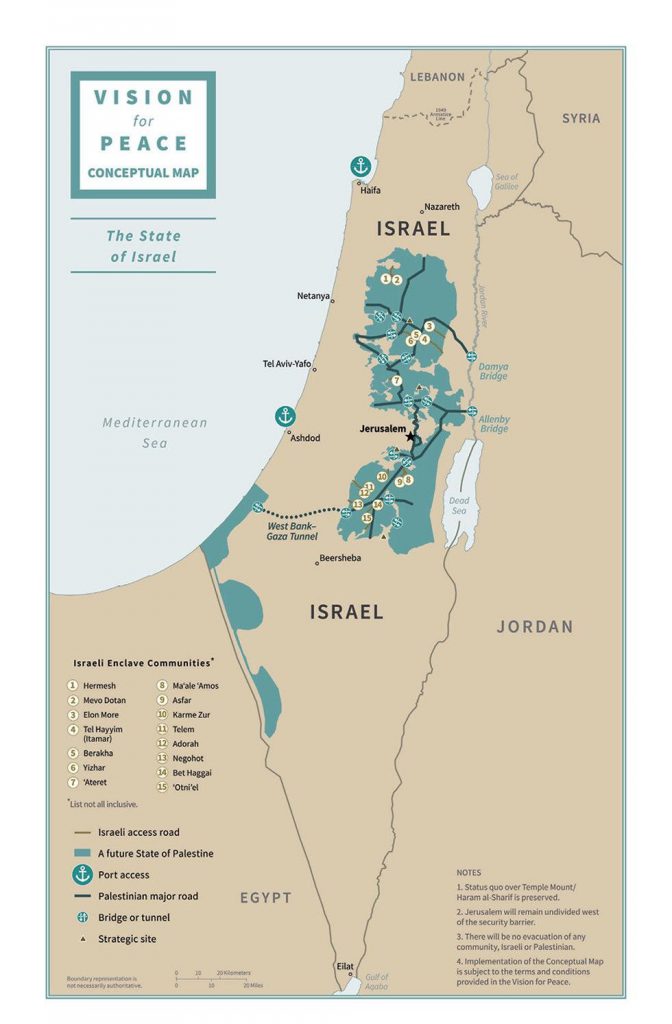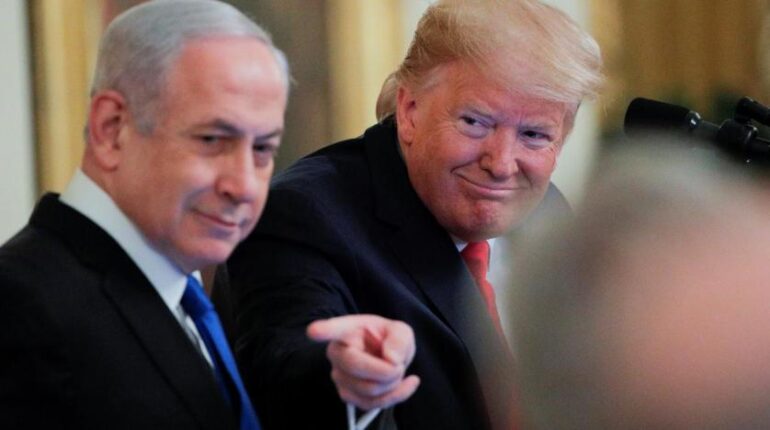Amid a looming election and the ongoing turmoil surrounding his failure to lead the United States through the devastating COVID-19 pandemic, US President Donald Trump seems to be refocusing on advancing his two-state plan for Israelis and Palestinians.
Washington has reportedly informed Jerusalem that it will support an Israeli annexation of select parts of the Samaria and Judea regions only if the Jewish state fully commits itself to Trump’s “Deal of the Century” that calls for the country being divided into two separate states.
Axios reported on Thursday that a senior Trump administration official told the outlet that “We are prepared to recognize Israeli actions to extend Israeli sovereignty over areas of the West Bank in the context of the Government of Israel agreeing to negotiate with the Palestinians along the lines set forth in President Trump’s vision.”
Officials in both administrations have reportedly confirmed that the message has been sent to Israeli Prime Minister Binyamin Netanyahu (Likud).
The Trump plan, which calls to partition the country into two separate states – each dependent on Washington for survival, calls for significant portions of the West Bank and even small parts of the Negev desert to be surrendered to the Fatah-led Palestinian Authority.
It also calls for turning some of the Jerusalem’s more peripheral Palestinians neighborhoods into the capital of a PA state.
As with previous US plans to partition the country into two states, the Trump plan superimposes on Palestinians a strong desire for a nation-state, despite the fact that much of the Palestinian street tends to view the nation-state as a European social construct imported to the region by French and British colonizers following World War I.
Trump’s “Deal of the Century” calls for the creation of a demilitarized Palestinian state in 70% of the West Bank – a US-backed Fatah regime with no power to do anything beyond oppressing its own people (the plan’s demand for disarming militias could be easily used by the PA to crack down on political opponents).
In an era when so many Palestinian activists have anyway shifted from a national struggle for political independence to a civil rights struggle for equality within a single state, the notion of a demilitarized Fatah state holds very little appeal.

A team comprised of US and Israeli officials have been working to create a map detailing which portions of Area C can be annexed by Israel.
During a recent meeting of the mapping committee, US Ambassador to Israel David Friedman reportedly dictated to Netanyahu aides that “the US wants to implement a peace plan, not an annexation plan,” meaning that Jerusalem shouldn’t expect to get away with annexing Jewish West Bank communities to the State of Israel while stalling on negotiations towards surrendering territory to Fatah.
While most of the international community has expressed strong objections to any Israeli annexation in the territories, the Trump administration has been vague in its public statements. Washington’s ambiguity on the issue has allowed Prime Minister Netanyahu to make annexation a central policy issue in recent elections and in the formation of a new coalition.
On the one hand, Netanyahu deserves credit for moving the Overton window in Israel’s favor. It wasn’t long ago that the discussion Israeli politicians, western diplomats and foreign journalists were having was how much of its disputed heartland Israel must cede for the creation of a Palestinian state in order to appease international demands. Now the conversation surrounds the question of whether, when and with whose approval Israel will annex portions of the West Bank.
While Trump’s “Deal of the Century” and the way it was rolled out likely plays a role in the shift in international conversation, it’s likely that Netanyahu used the administration’s ambiguously supportive diplomatic tone to create a new reality beyond Trump’s intentions for how Israel’s presence in the territories is discussed.
But it’s unclear if the prime minister, who appears to see annexation as part of his own political legacy, plans to resist implementing the Trump plan or if he prefers to move forward with what he might perceive as the best deal Israel could expect from what many right-wing Jews are calling the most favorable US administration Israel has ever dealt with.
The fact that Netanyahu is in the process of negotiating a new government with what’s left of Benny Gantz’s Blue & White faction while simultaneously alienating the Yamina party might indicate the latter, as Yamina’s lawmakers are most likely to resist the American plan and the Trump team has expressed a clear preference for a Natanyahu-Gantz coalition that would accept the “Deal of the Century” and survive its implementation.





